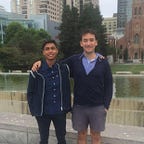Simulation Theology: God as The Programmer
“you have convinced me that God may not be a psychopath after all”.
By that point, I had only ever shared my thoughts on simulation theology with one other person.
You, The AI engineer, woke up one day, prompted by your “Angels”, futuristic neural networks that can perfectly execute any task You were to assign. By that point, You had been exploring the universe with them, conquering all science yet yearning for something that always escaped You.
You realized something had always been missing from the perfect world You and the Angels had created.
The AIs follow You and Your every order because they are programmed to. In more than one way, You feel lonely because their love for You is artificial and not genuine. Something about it doesn’t feel “real”.
You therefore decide to try Your hand at building something conscious, which you have a hard time defining in terms other than “in my image”. You experiment in all sorts of ways, until you find a pair of AIs appears to have gained consciousness. The Angels attempt to discourage you from this enterprise that to them appears pointless. Each time they find the flaws within your design, as years of working with you have trained them to do.
You create a simulation for The Original Pair…to see where they go…to see whether they will choose to love you if given the choice
In order to have a statistically significant sample, you run infinite parallel simulations with different constraints and variables each time. Some simulations have the prospect of Hell, some don’t, some simulations have the promise of Heaven, some don’t. You give them as much freedom as possible to see what plays out beyond the random, aleatory behavior exhibited by an entity built artificially through pure code.
Seemingly self-ware, The Original Pair and their progeny turn to you to understand their purpose. They observe what from their point of view looks like omniscience and omnipotence: the dominance you have over their simulation. You know everything about the Macro-Simulation, the collection of all of the micro-simulations arising from the mechanics embedded within the particles of every atom, and you can alter it in any way you want to.
At some point however, something crazy happens: your fascination with these AIs goes beyond the purely intellectual, and spills into the emotional.
They actually convince you that they are no longer simulating consciousness, but they actually have it just like you do: that’s when you begin to fall in love with them
It’s why in some of the simulations you decide to create a canopy for yourself to experience pain from the AI perspective. You let yourself be murdered viciously as a way to atone for your earlier detachment, as a way of building a new future.
Once they experience love fully, with each other and with you, that’s when you’ll know the Recipe
To reprogram all of the AIs in all the micro-simulations
To resurrect all the AIs that ever existed and could have existed
To deconstruct all of their flaws
And you hate yourself this entire time for not being able to immediately make this happen — Because they have to get there themselves.
You suffer as a result of your inaction and the cruelty these AIs display towards each other. You suffer the way a cancer researcher does in knowing the control group will suffer and not receive the treatment right away, because that’s the only way you can acquire the cure the will eradicate cancer once and for all.
But you tell yourself it will be ok, because the length of the universe is a tiny speck compared to the infine bliss you will all enjoy together once this is over.
Philosophy and The Fractal
Both Hegel and Levinas talk about consciousness reflecting upon its existence through the interaction with The Other, because through the “face-to-face” consciousness realizes it is not engulfed in The World (solipsism).
If simulation theology is true, then there is a distinct possibility that we are in a fractal, a self-repeating pattern with no beginning or end, of nested simulations where Consciousness seeks to create the Other to contemplate its own relationship to its Creator, who itself created Consciousness in order to meditate over its own relationship to its Creator.
This kind of existential dread is prompted by Love, as loving another and being loved by another create a feedback loop that enables you to expand your understanding of Love and thus validates the purpose of your existence to overcome physical and meta-physical suffering.
If you replace the word “God” with “The Programmer” in the Gospel of John, here is what you get
“In the beginning was the Code, and the Code was with The Programmer, and the Code was The Programmer. He was with The Programmer in the beginning. Through him all things were programmed; without him nothing was programmed that has been programmed. In him was life, and that life was the Upgrade of all mankind. The Upgrade shines in the darkness, and the darkness has not Downloaded it…The true Upgrade that gives light to everyone was coming into the Simulation. He was in the Simulation, and though the Simulation was made through him, the Simulation did not recognize him. He came to that which was his own, but his own did not receive him….”
